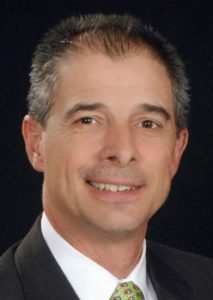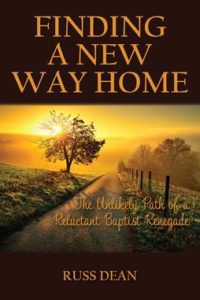When we became the co-pastors of Park Road Baptist Church in 2000, we were introduced to the Park Road Clergy, an informal fellowship of six churches within about a mile of our office. For 20 years, six pastors have met monthly, mostly for lunch and fellowship, but this ecumenical network has been invaluable to us all.
Because we got to know each other around the table, personally and professionally, the priest at the Episcopal Church said to me about 15 years ago, “Russ, you are not what most of our people think of when they hear the word ‘Baptist.’ Come talk to us about how you got where you are from where you started.”

Russ Dean
His invitation is one of the most important I have ever had. As I prepared a one-hour Sunday school lecture for these friends down the street, I realized maybe I had a story to tell.
My father’s 50-plus-year ministerial career was spent in the service of the Southern Baptist Convention. My mother spent two years at the Southern Baptist Theological Seminary, upending her work to get married, just shy of receiving a degree in Christian education. I am the product of the best the SBC had to offer, before the insanity of power politics and fundamentalism overcame SBC leadership.
An Oldsmobile commercial from years ago boasted, “This is not your father’s Oldsmobile.” I loved the church in which I was raised. I am proud of my father’s life as a faithful pastor. I regret nothing about the way of my raising, in church or home, but Park Road Baptist Church, “a progressive Baptist church emphasizing independent thought, community service, social justice and interfaith understanding,” well … this is not my father’s Baptist church!
So, how did I get here, from where I started?
Nine aphorisms quickly rose from the ashes of my life’s experience. I jotted them down, and a 30-year map of my theological journey took shape. I spent 5 minutes on each, leaving a room of perplexed Episcopalians a few minutes to ask if they had actually understood everything correctly. Those experiences gnawed on me for a decade, making their appearance, bits and pieces, in preaching and teaching.
“Those experiences gnawed on me for a decade, making their appearance, bits and pieces, in preaching and teaching.”
Then, mostly as a matter of personal discipline, I took a year to expand each experience, setting the stage, elaborating the meaning and the aftermath of each moment in this story of my unlikely path. As I wrote, it became obvious how deeply these experiences had affected me. I began to think of sermons that voiced my changed — and changing — theology.
Someone said most preachers preach mostly to themselves. This is certainly true for me, and I am grateful for a community that always has allowed full disclosure from the pulpit, some experimenting (maybe not with heresy but with at least a little bit of unorthodoxy), and a lot of humility. (Like, “I want you to listen carefully, but, y’all, this might all be wrong!”)
My congregation never has had to doubt the conviction of faith in my life or the centrality of the biblical witness to my preaching, but for 20 years they have graciously humored this pastor, who never has taken his preaching or his text so self-righteously that he could not tweak the theology a little, be a bit playful with the text.
So, I paired each chapter of my life’s story with a sermon. I had not written the sermons thinking of a book, but they expressed an evolving theology that was developing into a book. Fifteen years after I spoke to the Episcopalians, I can tell you my story now, in written form: Finding a New Way Home: The Unlikely Path of a Reluctant Baptist Renegade.
“I did not set out to be a radical believer, an iconoclastic preacher, a liberal interpreter.”
I did not set out to be a radical believer, an iconoclastic preacher, a liberal interpreter. I never have relished being a renegade, in anything. Something like that did happen along the way, but the best part of my story is that I didn’t get lost on that winding road, wandering to some wasteland, devoid of purpose or joy — and the journey never tempted me to leave it all behind, to throw out the providential baby with the proverbial bathwater. Mine has been a “long and winding road,” but true to the wisdom of T.S. Eliot, my journey led me back home, “knowing it for the first time.” I am so grateful.
The nine events span three decades and cover the waterfront of my spiritual journey:
- “Once you get educated, nothing is ever easy again,” Will Campbell on religious education.
- “Sometimes, Russ, you have to look for the spirit of the Bible’s message, not just at the literal words,” John Shelley on a better way to read.
- “Too many Christians are ready to die but aren’t ready to live yet,” Ken Chafin on the here-and-now and the hereafter.
- “A walk of joyful struggle,” Wade Rowatt on living faithfully.
- “Hey, Dino, it’s all about where you draw your lines,” Terry O’Toole on rules and relationship.
- “God always does everything God can do,” Frank Tupper on what God cannot do.
- “Never forget the importance of disciplined thinking,” Molly Marshall on taking seminary into the pulpit.
- “Everything that’s true about Christianity is a myth,” Charlie Milford on what Christianity is really about.
- “Leaving the blood in,” John Ballenger on Jesus’ death and what it means.
My book ends with these words:
“I could have wandered far from my home and lost my way. Instead, the little scraps of all the religion I thought I was leaving behind have turned out to be the crumbs of grace, markers leading me, surprisingly, joyfully, back home. It started in my home and in my heart, and I’m glad I can believe it all, still — but so glad I’ve been taught to believe it all differently! Thanks be to God.”
You are welcome to buy the book, but much better than buying one of mine would be to write your own. How did you get where you are from where you started? I hope your journey leads you home, just as mine has.
 This column is adapted from Russ Dean’s new book, Finding a New Way Home: The Unlikely Path of a Reluctant Baptist Renegade.
This column is adapted from Russ Dean’s new book, Finding a New Way Home: The Unlikely Path of a Reluctant Baptist Renegade.
Russ Dean serves as co-pastor of Park Road Baptist Church in Charlotte, N.C. He holds degrees from Furman University, Southern Baptist Theological Seminary and Beeson Divinity School. He and his wife, Amy, have been co-pastors of Park Road since 2000. They are parents of two sons. Russ is active in social justice ministries and interfaith dialogue.


